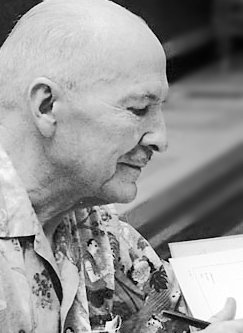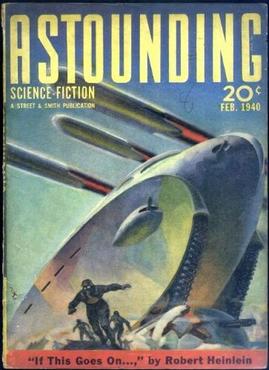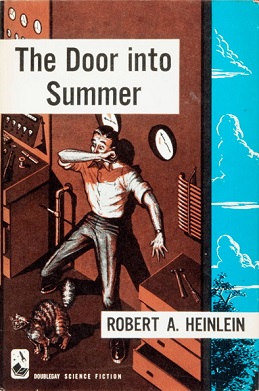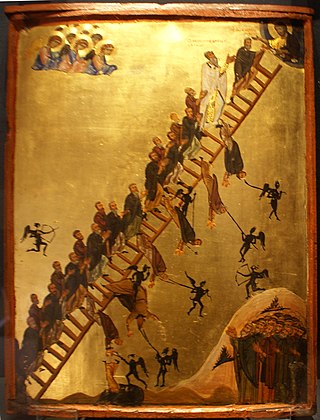
This I Believe: Our Noble, Essential Decency is an essay written and recorded by Robert A. Heinlein in 1952, as part of the Edward R. Murrow's series "This I Believe" on the CBS Radio Network, generally seen as the most popular of that series. [1]

This I Believe: Our Noble, Essential Decency is an essay written and recorded by Robert A. Heinlein in 1952, as part of the Edward R. Murrow's series "This I Believe" on the CBS Radio Network, generally seen as the most popular of that series. [1]
Heinlein's essay differs from others in the series by focusing on Heinlein's belief in "my fellow man", naming individuals and communities in the United States in general.
He starts out by saying he's not going to discuss religious beliefs, but "matters so obvious that it has gone out of style to mention them."
Initially, he mentions specific people, his neighbors, mentioning by name a local pastor of a different denomination than himself and the local veterinarian, and describing their charitable behavior. He goes on to say:
I believe in my townspeople. You can knock on any door in our town, say "I'm hungry," and you’ll be fed. Our town is no exception. I found the same ready charity everywhere. For the one who says, "The heck with you, I’ve got mine," there are a hundred, a thousand, who will say, "Sure pal, sit down." I know that despite all warnings against hitchhikers, I can step to the highway, thumb for a ride, and in a few minutes a car or a truck will stop and someone will say, "Climb in Mack. How far you going?"
I believe in my fellow citizens. Our headlines are splashed with crime. Yet for every criminal, there are ten thousand honest, decent, kindly men. If it were not so, no child would live to grow up. Business could not go on from day to day. Decency is not news. It is buried in the obituaries, but it is a force stronger than crime.
He then names the members of a number of professions seen as serving the public good, like nurses and craftsmen. He makes the unusual assertion (both for the times, and considering his own libertarian ideals) of saying he believes in most politicians. Most.
A noteworthy entry in his list is Rodger Young, a Medal of Honor recipient from WWII and the kickoff for his inclusion of "unnamed heroes from Valley Forge to the Yalu River", and his general pride in being an American.
But the essay is also seen as noteworthy in his subsequent inclusion of "my whole race—yellow, white, black, red, brown—in the honesty, courage, intelligence, durability, and goodness of the overwhelming majority of my brothers and sisters everywhere on this planet. I am proud to be a human being."
Generally the best-received entry in the series, Heinlein's essay has continued to be cited as a favorite, according to the This I Believe, Inc., which still promotes the series and cultivates new essays.
It was published as "This I Believe", in the 1992 Heinlein anthology, Requiem, in the audiobook version read by his widow Virginia Heinlein.
Agnosticism is the view or belief that the existence of God, of the divine or the supernatural is unknown or unknowable. Another definition provided is the view that "human reason is incapable of providing sufficient rational grounds to justify either the belief that God exists or the belief that God does not exist."

Robert Anson Heinlein was an American science fiction author, aeronautical engineer, and naval officer. Sometimes called the "dean of science fiction writers", he was among the first to emphasize scientific accuracy in his fiction, and was thus a pioneer of the subgenre of hard science fiction. His published works, both fiction and non-fiction, express admiration for competence and emphasize the value of critical thinking. His plots often posed provocative situations which challenged conventional social mores. His work continues to have an influence on the science-fiction genre, and on modern culture more generally.

"If This Goes On—" is a science fiction novella by American writer Robert A. Heinlein, first serialized in 1940 in Astounding Science-Fiction and revised and expanded to novel length for inclusion in the 1953 collection Revolt in 2100. The story shows what might happen to Christianity in the United States with mass communications, applied psychology, and a hysterical populace. The story is part of Heinlein's Future History series.
"The Green Hills of Earth" is a science fiction short story by American writer Robert A. Heinlein. One of his Future History stories, the short story originally appeared in The Saturday Evening Post, and it was collected in The Green Hills of Earth. Heinlein selected the story for inclusion in the 1949 anthology My Best Science Fiction Story. "The Green Hills of Earth" is also the title of a song mentioned in several of Heinlein's novels.

The Door into Summer is a science fiction novel by American science fiction writer Robert A. Heinlein, originally serialized in The Magazine of Fantasy & Science Fiction. It was published in hardcover in 1957.
Lazarus Long is a fictional character featured in a number of science fiction novels by Robert A. Heinlein. Born in 1912 in the third generation of a selective breeding experiment run by the Ira Howard Foundation, Lazarus becomes unusually long-lived, living well over two thousand years with the aid of occasional rejuvenation treatments. Heinlein "patterned" Long on science fiction writer Edward E. Smith, mixed with Jack Williamson's fictional Giles Habibula.
Misotheism is the "hatred of God" or "hatred of the gods".

Ibrahim was a prophet and messenger of God according to Islam, and an ancestor to the Ishmaelite Arabs and Israelites. Abraham plays a prominent role as an example of faith in Judaism, Christianity, and Islam. In Muslim belief, Abraham fulfilled all the commandments and trials wherein God nurtured him throughout his lifetime. As a result of his unwavering faith in God, Abraham was promised by God to be a leader to all the nations of the world. The Quran extols Abraham as a model, an exemplar, obedient and not an idolater. In this sense, Abraham has been described as representing "primordial man in universal surrender to the Divine Reality before its fragmentation into religions separated from each other by differences in form". Muslims believe that the Kaaba in Mecca was built by Abraham and his son Ishmael as the first house of worship on earth. The Islamic holy day 'Eid ul-Adha is celebrated in commemoration of Abraham's willingness to sacrifice his son on God's command, as well as the end of the Hajj pilgrimage to the Kaaba.

Pascal's wager is a philosophical argument advanced by Blaise Pascal (1623–1662), seventeenth-century French mathematician, philosopher, physicist, and theologian. This argument posits that individuals essentially engage in a life-defining gamble regarding the belief in the existence of God.

The evil demon, also known as Deus deceptor, malicious demon, and evil genius, is an epistemological concept that features prominently in Cartesian philosophy. In the first of his 1641 Meditations on First Philosophy, Descartes imagines that a malevolent God or an evil demon, of "utmost power and cunning has employed all his energies in order to deceive me." This malevolent God or evil demon is imagined to present a complete illusion of an external world, so that Descartes can say, "I shall think that the sky, the air, the earth, colours, shapes, sounds and all external things are merely the delusions of dreams which he has devised to ensnare my judgement. I shall consider myself as not having hands or eyes, or flesh, or blood or senses, but as falsely believing that I have all these things."
Gorgias is a Socratic dialogue written by Plato around 380 BC. The dialogue depicts a conversation between Socrates and a small group of sophists at a dinner gathering. Socrates debates with the sophist seeking the true definition of rhetoric, attempting to pinpoint the essence of rhetoric and unveil the flaws of the sophistic oratory popular in Athens at the time. The art of persuasion was widely considered necessary for political and legal advantage in classical Athens, and rhetoricians promoted themselves as teachers of this fundamental skill. Some, like Gorgias, were foreigners attracted to Athens because of its reputation for intellectual and cultural sophistication. Socrates suggests that he (Socrates) is one of the few Athenians to practice true politics (521d).

Omnism is the respect of or belief in all religion. Those who hold this belief are called omnists. In recent years, the term has been resurfacing due to the interest of modern-day self-described omnists who have rediscovered and begun to redefine the term. Omnism is similar to syncretism, the belief in a fusion of faiths in harmony. However, it can also be seen as a way to accept the existence of various religions without believing in all that they profess to teach. Many omnists say that all religions contain truths, but that no one religion offers all that is truth.
Iman in Islamic theology denotes a believer's recognition of faith and deeds in the religious aspects of Islam. Its most simple definition is the belief in the six articles of faith, known as arkān al-īmān.
This I Believe was originally a five-minute program, originally hosted by journalist Edward R. Murrow from 1951 to 1955 on CBS Radio Network. The show encouraged both famous and everyday people to write short essays about their own personal motivation in life and then read them on the air. This I Believe became a cultural phenomenon that stressed individual belief rather than religious dogma. Its popularity both developed and waned within the era of U.S. Senator Joseph McCarthy and the Cold War.

Requiem: New Collected Works by Robert A. Heinlein and Tributes to the Grand Master is a retrospective on Robert A. Heinlein (1907–1988), after his death, edited by Yoji Kondo.

Broca's Brain: Reflections on the Romance of Science is a 1979 book by the astrophysicist Carl Sagan. Its chapters were originally articles published between 1974 and 1979 in various magazines, including The Atlantic Monthly, The New Republic, Physics Today, Playboy, and Scientific American. In the introduction, Sagan wrote:
As long as there have been human beings, we have posed the deep and fundamental questions. ... If we do not destroy ourselves, most of us will be around for the answers. ... By far the most exciting, satisfying and exhilarating time to be alive is the time in which we pass from ignorance to knowledge on these fundamental issues.
"The Will to Believe" is a lecture by William James, first published in 1896, which defends, in certain cases, the adoption of a belief without prior evidence of its truth. In particular, James is concerned in this lecture about defending the rationality of religious faith even lacking sufficient evidence of religious truth. James states in his introduction: "I have brought with me tonight ... an essay in justification of faith, a defense of our right to adopt a believing attitude in religious matters, in spite of the fact that our merely logical intellect may not have been coerced. 'The Will to Believe,' accordingly, is the title of my paper."
There are many Biblical figures which the Qur'an names. Some, however, go unnamed in the Qur'an, but are referenced or referred to in the hadiths, tafsirs, literature or seerah. Other figures are mentioned elsewhere in tradition and in the sunnah and sayings of Muhammad. Such figures which are not mentioned by name in the Qur'an, are included below.

In Christianity, heaven is traditionally the location of the throne of God and the angels of God, and in most forms of Christianity it is the abode of the righteous dead in the afterlife. In some Christian denominations it is understood as a temporary stage before the resurrection of the dead and the saints' return to the New Earth.

Edinburgh: Picturesque Notes is a non-fiction travel book written by the Scottish author Robert Louis Stevenson. It was first published in December 1878 as "a paean to his birthplace" and was his second published book following An Inland Voyage. A new edition of the book was published by the London publishing company Manderley Press in 2021, featuring an introduction by Alexander McCall Smith.